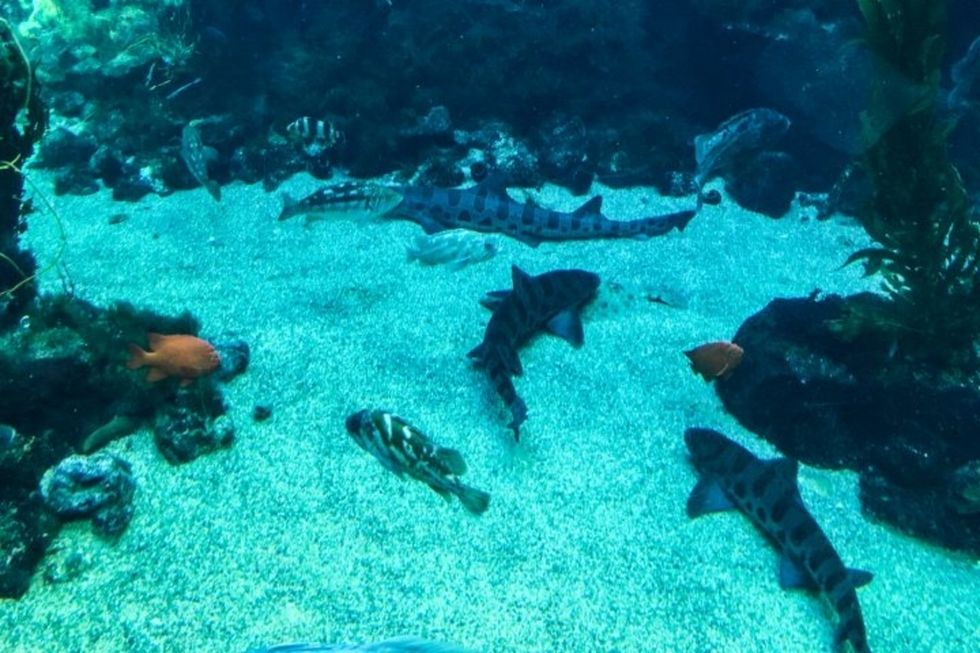Sharks have always been portrayed as the ocean's most monstrous killer, and for decades they have been represented in the media as ferocious and vicious predators of any human who dares set foot in the ocean. From the characters we see on TV to the stories we hear in the news, conserving the shark species is the last thing being promoted to the members of our own population. What we fail to realize is that A) the media characterizes sharks in a way that is far from accurate and then manages to capitalize off the demonic portrayal of the species, and B) we fail to educate ourselves on shark behavior and their vitality to the well-being of the ocean, not to mention the ecosystem. Below you will find reasons as to why we need sharks ALIVE along with how and why humans are keeping that from happening.
1. Sharks are a vital part of the ocean's well-being.
Sharks feed on the sick and the old, meaning they keep the ocean healthy by not only strengthening the gene pools of other species, but also preventing the spread of diseases among sea life. Think of how many countries depend on the ocean as a source of food, and how sharks play a role in the food we eat. The more fish brought to land that carry viruses, diseases or are near death, the less people will be able to consume fish. Some cultures depend heavily on the ocean for their food source along with the nutrients those foods provide.
Because sharks are at the top of the food chain they keep other fish healthy and in proper proportion to ensure a healthy ecosystem. They also prevent other species from becoming too populous and keep the structure of ocean life from essentially collapsing. They feed on carcasses, and regulate other species from overgrazing vital habitats. Scientists have even gone as far to state that the shark's natural intimidation factor may have more of an impact on the ecosystem than what they are actually eating.
2. Humans are hunting sharks into extinction.
Approximately 1/4 of shark and ray species are threatened with extinction, with over half of shark species being data deficient, meaning enough information isn't being assessed to determined how threatened some of these species really are. Some may already be extinct; these sharks are referred to as "lost" by the IUNC. Extinction is a real threat to sharks, and it's not just for their fins or leisure fishing either. The Shark Trust breaks down the many reasons sharks are being hunted, which I have pasted below.
- MANTA & DEVIL RAY GILL PLATES - This is due to the Chinese medicinal trade. It's claimed that gill rakers can filter out disease and toxins from the body. The gill rakers, which are used by the rays to filter zooplankton from the water, are often consumed in a soup called Peng Yu Sai. They’re worth an estimated US$11 million annually. The gill plate trade, centered in Guangzhou, China, has stimulated intensive fishing for these rays in many countries.
- SHARK LIVER OIL (labelled squalene/squalane) - this can be found in a surprising number of products. From moisturizers, deodorants and sun tan lotion, to lip balm, lipsticks and other cosmetics. It's also used in vaccines, pills and supplements. The highest return of squalene comes from the livers of deep sea sharks. And so, they're intensively fished. Due to the nature of their biology they're unable to withstand this level of fishing pressure. Many are now listed on the IUCN Red List of Threatened species.
- SHARK CARTILAGE - is sold as a health supplement in many health food shops and pharmacies. It's believed to help a variety of conditions, including arthritis, shingles, rheumatism, hemorrhoids, psoriasis and even cancer. Yet there's no clinical evidence to support these claims
- SHARK LEATHER (shagreen) - shark skin has been used for decades to make leather because it's so durable. It's particularly popular in the United States, northern Europe and Japan. It's used to create luxury items such as, wallets, shoes (including football boots created by the brand Kelme), handbags, watch straps, belts, gloves, jackets and furniture. As well as sandpaper and on sword handles, as its rough texture helps with grip.
- SHARK TEETH & JAWS - these can often be seen for sale in seaside tourist shops. Despite the fact that in many countries it's illegal to catch sharks. White Sharks are protected under CITES, yet their teeth and jaws can fetch huge sums on the black market. A single tooth can sell for over $100 and a whole set of jaws can fetch up to $10,000 in the USA. Sadly, illegal smuggling of White Shark teeth is becoming increasingly common in countries such as South Africa.
3. Sharks can't repopulate fast enough to save their species.
Sharks reach the age of reproduction when they are 12-15 years old. Many sharks don't even live that long, and if they do, they only produce 1-2 offspring in their lifetime, carrying their pups anywhere from 9-12 months before delivering them. This poses as a huge disadvantage in repopulating the species when marine studies show over 100 million sharks are killed, just by humans, each year.
As you can see, sharks are imperative to the ocean's ecosystem and overall well-being. As long as they are being mass hunted, they can not possibly reproduce fast enough to maintain their positions in keeping the ocean healthy and functioning as it should. We have to stop hunting sharks and aid in the prevention of their extinction and that starts with refusing to let the media intimidate us into allowing an essential species to be depleted.

















